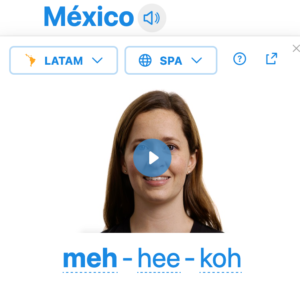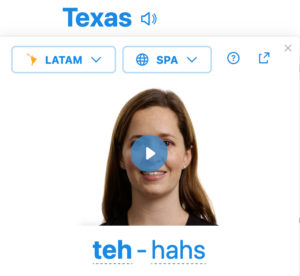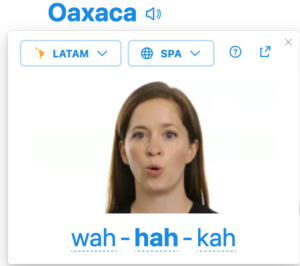The video and blog in yesterday’s post said,
All of the letters below sound the same in Spanish as they do in English. Or at least close enough that if you pronounce them like English you’ll sound fine.
F, M, N, S, P, K, W
Sh, Ch
B, V, X**B, V, and X have some minor differences from English, but it’s okay if you ignore those differences for now. You’ll still sound good if you apply the other rules in this post.
That bothered me because I know the x the Spanish word México is pronounced like the Spanish j (our h).
And the same thing is true of the word Texas and Oaxaca:
So what gives? The information was on the internet, of course…it just took a little digging. It turns out they kept the indigenous pronunciations of those words but for some reason didn’t change the spelling. They’re exceptions to the rules and nothing to worry about. All’s right with the world again.
July 13 2023




we all know the internet is Perfect! ha ha.. when searching or researching things I often find severak answers that different for each search, knowing how to pick the right one requires a lot of times. I always say so says google girl. might be the right answer and might not be
“knowing how to pick the right one requires a lot of time”. Needless to say this one took a few hours, but it was worth it.
You go, girl! When the answer’s not immediately obvious, you keep right on digging.
It was fun, thanks to the internet being there for me. 🙂
You solved it!! I have heard that English is one of the hardest languages. Maybe because we have so many exceptions to the rule?
It’s hard because of the spelling….the spelling of so many words need to be memorized. Spanish is so much easier that way.
Good job getting that figured out. That could get confusing.
Thanks. 🙂
It also helps to know that, in Spanish, j is pronounced h and ll is pronounced y. Thus, the city is California that is spelled La Jolla is pronounced as if it was spelled La Hoya. Yes, there are still rules to be learned. For me it was hard to learn that nouns had gender so I had to learn which nouns were masculine and which were feminine. Not hard if it ended in a or o but otherwise…
The neat thing about being born and raised in California is that we’re raised knowing that. 🙂
So many rules to learn! Including that upside down e.
That upside down e video was profound. So simple but such a big help.